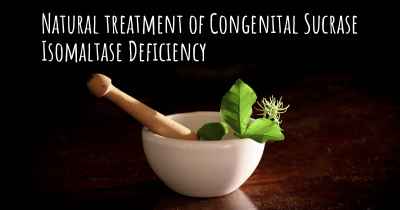Congenital Sucrase Isomaltase Deficiency prognosis
What is the prognosis if you have Congenital Sucrase Isomaltase Deficiency? Quality of life, limitations and expectatios of someone with Congenital Sucrase Isomaltase Deficiency.

Congenital Sucrase Isomaltase Deficiency (CSID) Prognosis
Congenital Sucrase Isomaltase Deficiency (CSID) is a rare genetic disorder that affects the ability to digest certain sugars, specifically sucrose and starch. This condition is caused by mutations in the sucrase-isomaltase (SI) gene, which leads to a deficiency or absence of the enzyme sucrase-isomaltase in the small intestine.
The prognosis for individuals with CSID can vary depending on the severity of the condition and the individual's ability to manage their diet. Some individuals may experience mild symptoms and can lead relatively normal lives with proper dietary modifications, while others may have more severe symptoms that can significantly impact their quality of life.
Management and Treatment:
The primary treatment for CSID involves dietary modifications to avoid foods that contain sucrose and starch. This typically involves following a strict low-sugar, low-starch diet, which can help alleviate symptoms and improve overall digestion. Working with a registered dietitian who specializes in CSID can be beneficial in developing an appropriate meal plan.
In some cases, enzyme replacement therapy may be considered. This involves taking oral supplements of the missing enzyme sucrase-isomaltase to aid in the digestion of sugars. However, the effectiveness of this therapy can vary among individuals.
Prognosis:
The long-term prognosis for individuals with CSID is generally positive with proper management. By adhering to a strict diet and avoiding trigger foods, individuals can experience a significant reduction in symptoms and improve their overall digestive function.
However, it is important to note that CSID is a chronic condition that requires lifelong management. Compliance with dietary restrictions and regular follow-up with healthcare professionals are crucial for maintaining optimal health and managing symptoms effectively.
With advancements in research and medical understanding, there is ongoing progress in the development of new treatment options for CSID. This provides hope for improved outcomes and quality of life for individuals with this condition in the future.
I will have this condition for life. It is an inconvenience, but it does not rule my life, I still do all the things I want to, I am a fit, active and healthy person. Wether later in life I will experience bowel problems due to my symptoms over the years, only time will tell.
Posted Mar 8, 2019 by Simone 3215
Posted Nov 15, 2021 by Tracey 3000








